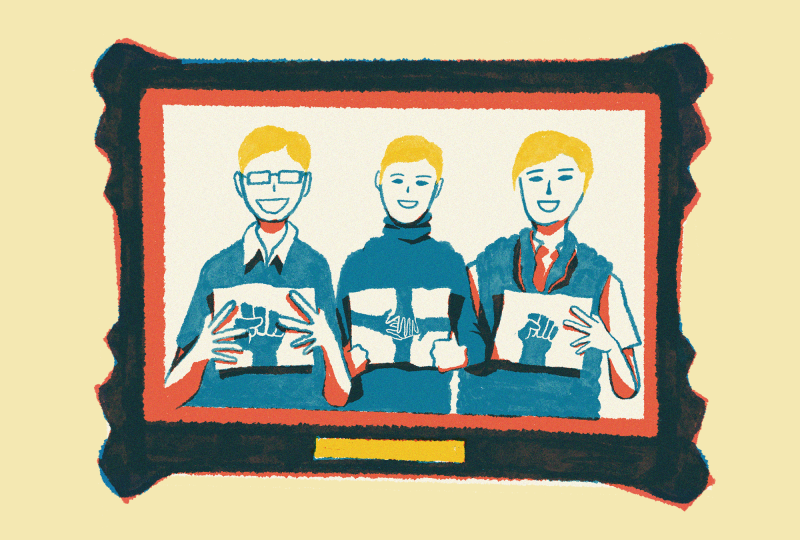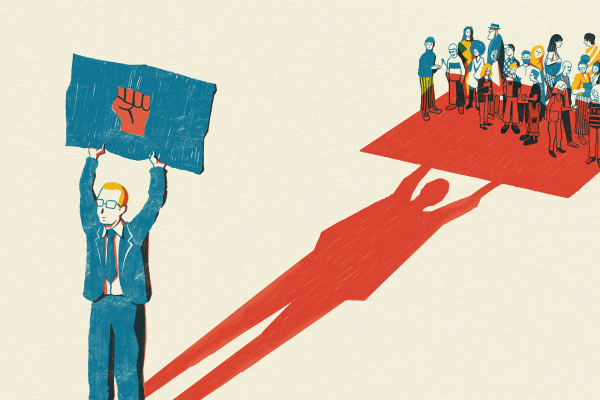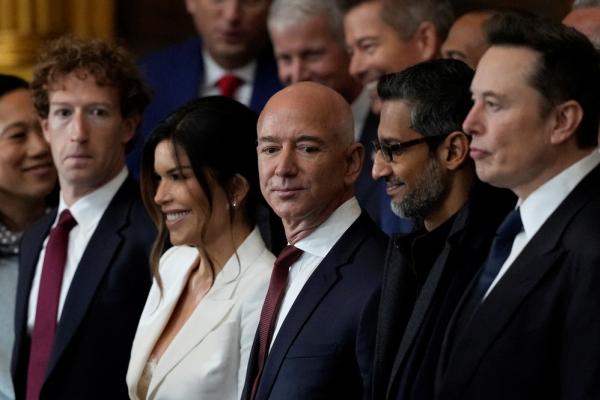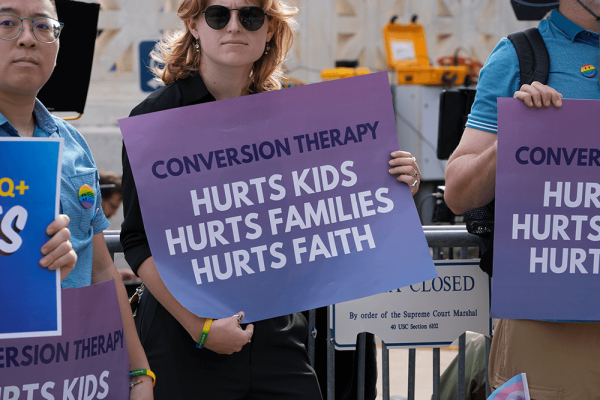Editor’s note: A version of this article first appeared on sojo.net on Jan. 9, 2024 as “What DEI Trainings and Evangelical Retreats Have in Common.”
JONATHAN TRAN TELLS a story he encountered while researching his book Asian Americans and the Spirit of Racial Capitalism, about Chinese immigrants who lived in the Mississippi Delta during the Reconstruction period. After the Civil War, Tran says, white people not only prevented Black people from living in certain neighborhoods and attending schools with their white children — they discriminated similarly against people of Chinese descent.
But dissimilar to the Delta’s Black population, the Chinese immigrants were able to open modest grocery stores, which allowed them to accumulate wealth thanks to Black patronage. In this way, the Delta Chinese immigrants saw their material conditions improve — but this improvement came under a system of white supremacy, which necessitated the exclusion of the Delta’s Black population.
Tran tells this story to demonstrate the ways that capitalism and white supremacy have become intertwined. In a nod to the Black radical tradition, Tran refers to this system as racial capitalism. The account also demonstrates Tran’s commitment to storytelling. He doesn’t explain the negative effects of racial capitalism in a removed or abstract way; rather, he leans into the complicated histories that have pitted racially marginalized groups against one another.
Tran, an associate dean of Baylor University’s Honors College and an associate professor of theology, understands how stories are influenced by material reality — which is why, for Tran, criticism of racism that does not also include a critique of the capitalist system is wrong-headed. But Tran doesn’t just critique racial capitalism or anti-racist enterprises that avoid economics. Tran believes that Christian theology offers an alternative story to racial capitalism, one that finds its locus in the “divine economy.”
Tran talked with sojo.net associate opinion editor Josiah R. Daniels last fall about Christian theology, anti-racism, W.E.B. Du Bois, and what it means to live into a reconstructed reality. — The Editors
Josiah R. Daniels: Tell me about your newest book, Asian Americans and the Spirit of Racial Capitalism.
Jonathan Tran: My background is primarily in philosophical theology. I’m very interested in language and how concepts work. I began to grow suspicious of the way we talk about race and the origins of racism as finding their home in certain kinds of academic disciplines — for example, thinking that racism is a by-product of Enlightenment philosophy. These were the kinds of ideas that we academics really like but seemed increasingly unpersuasive to me. These arguments often ensued in ways completely irrespective of the material conditions of the world, as if racism is primarily a theoretical problem — as if we got our arguments right, we could crack the problem of racism.
Anti-racism in the popular discourse, which is deeply personalist, imagines racism as primarily beginning between my ears and then insidiously working its way out. So, I have bad, prejudicial views toward you as a person of color, or you do of me. These prejudice your ways of seeing me. And then they lead to racist behaviors. [A “personalist” approach says] if “racism” is something that exists in persons, then “anti-racism” is a kind of search-and-destroy mission of finding the source material and then educating us out of racism by getting you to think better things about Asian people or Black people.
My account of racism banks back into a vision that concepts work in the world not because they’re good ideas, but because they map onto concrete realities in relation to things like housing, health care, education. The concepts stick because they make sense of the material realities. The concept that a Black man is less than me “makes sense” because the material world seems to give coherence to that idea. Black folks have not been given access to health care or education in the same ways as others for hundreds of years. So, the idea that you are lesser-than “works” because it maps onto that reality. It’s not an idea in and of itself that comes out of me as an individual; it’s a systemic reality. It’s not “individuals lead to systems and structures.” It’s always: “Systems and structures require diseased imaginations to make sense of our world.”
It’s what I call the ultimate gaslighting move. It justifies oppression by laying blame on the oppressed, by locating it in something natural or essential to who they are — their race. This is a more complicated story, admittedly, than the personalist one, but it actually describes the world a bit better.
tran_2.png

Could you say more about the distinction between the personalist and the systemic understanding of racism and what that has to do with anti-racism work?
It’s helpful to think through the anti-racism strategy. Doing so exposes how deeply personalist and convenient it is.
Let’s say we think racism is a function of individuals. And let’s say the mortgage company on the street corner wants to become more anti-racist because they see what happened to Ahmaud Arbery, George Floyd, and so forth. They say, “We’re going to become more anti-racist — everyone else has put up Black Lives Matter flags on their building, and we’re going to do so too. The next step is to hire diversity, equity, inclusion (DEI) consultants to come in and train folks. What we’re really worried about is individuals who are secretly redlining Black applicants — it’s the ‘bad actor’ in the system. She’s personally possessed of these racist ideas. Our job is to train that out of her, and if we can’t educate her out of her racism, then we’re going to remove her from polite society — we’re going to fire her.”
Notice the utter convenience of this. It allows them to wash their hands of racism because they found their racist person. It endorses them as a liberal-minded, progressive company in a world of extraordinary anti-Blackness.
The reality is that they are part of an industry, namely housing, that is deeply and profoundly and persistently anti-Black. They live in an industry that depends on inherited wealth in a way that can never equalize the playing field. That wealth, oftentimes, is directly traceable to things like American chattel slavery, Jim Crow, and systems of segregation in our country such that by the time a poor Black family tries to get a loan, they can’t supply the one thing white families have as a matter of course: the basic lines of wealth that allow for down payments and accessible interest rates.
The great irony is that the personalist approach against racism is really racism by other means. The liberal, progressive forms of white racism have always been matched and mirrored to the kind of raging, white lunatic, Klan member racism. What we really need to be suspicious of is all those progressive folks who claimed the banner of, you know, Ta-Nehisi Coates, all while they send their kids to private schools in ways that disenfranchise local economies and directly bring harm on Black and brown children.
Philosopher Olúfemi O. Táíwò talks about how anti-racist efforts have been captured by rich progressives and how identity politics, which is connected to anti-racist efforts, has experienced “elite capture.” How can the church and Christian theology address these issues?
To be sure, the church is all up in the personalist account. My guess is you could probably find Christian origins to the personalist account. The same way that some want to personalize Christianity as just a personal relationship with Jesus probably creates parallels to the personalist account of racism. One of the most interesting parallels is the way DEI experientially looks a lot like an evangelical weekend retreat. DEI trainers come in and, over three days, they make white people feel really guilty for their whiteness or what have you, after which the company just goes back to its white kind of racist enterprise. Similarly, you go to an evangelical retreat: They drum up a bunch of energy Saturday night. You have your come-to-Jesus moment. Lots of emotion Sunday. You just go down the hill from the retreat and continue life in your regular sinful ways.
We have to begin by [recognizing] that the church has been deeply complicit in these things. But I don’t want to give up on Christianity. I’m in a desperate search for ways the church is not just a villain in the story. I’m looking for ways the church materially enacts a different imagination, for ways the church’s practices — its actual, concrete, material life — allow a different story to emerge and a different idiom of political economy that’s not built on exploitation. In the vast reaches of the church, there are wonderful practices that are deeply non-exploitative — and anti-exploitative — that help us come to terms with the possibility of an economy and imagination that I describe as “deep economy” or “divine economy.” The divine economy is the very opposite of exploitation and domination.
The very fact we exist at all is a function of divine gratuity and love, an expression of God’s grace, peace, and patience. That means creation is already preloaded, hardwired, if you will, as grace. We exist out of God’s abundance. This is a vastly different political economy than one that imagines the world is fundamentally bracketed by scarcity, and scarcity then pits us in competition with one another, and that [the construct of] race just further facilitates.
Once you have this divine economy of gratuity and grace and abundance, then you begin to imagine the world as fundamentally structured toward grace, justice, and mercy. It’s not that the church comes up with these ideas, it’s that the church lives this out in a way that allows us to see the concepts concretizing. The way we think about money, the way we think about strangers, the way we think about hospitality, the way that we think about resources, the way that we think about careers and vocations, the ways we live with each other, the sacramental ordering of baptism as a shared communal life, the understanding of the Eucharist as God saying, “This is my body, given for you,” around which other bodies gather and then mobilize — these are deeply political, economic terms. We have forgotten that, because we’ve been taught in the church to think on personalist, individual terms.
Baptism is often thought of as a story about individual salvation. Well, it is surely that, but my salvation can’t be thought of except in continuity with the salvation of others who’ve also been saved by Christ. So, baptism is both an entry into salvation and an entry into the community of salvation.
I would like to think that churches are a eucharistic presence in neighborhoods. Think about the very notion of bread. Bread is given to those who hunger. Maybe they hunger both in a bodily sense but also because they exist in a political/economic body that deprives them of the basic nutrients of life, oftentimes for identitarian and descriptive identity purposes. What Christ is saying is, “Here’s my body, given to this neighborhood.” But the giving of that body cannot be divorced from a church giving of itself. How does it give? It shares its resources. It imagines itself taking part in a community, being tutored and trained by that community, of giving its practical resources, educational resources, financial resources.
If I understand you, you are not coming out against diversity, equity, and inclusion, but you want to probe into how it is often personalized and how it is often just another cog in the system of racial capitalism. Is that correct?
That’s exactly right. If you hear a worry like mine, your antennae should come up for the ways that the Right is gaming the system. But if anything, my argument is an argument against the center-Left. My worry is that there are forms of diversity and anti-racism that are really center-Left capitalist enterprises.
In W.E.B. Du Bois’ Black Reconstruction in America 1860-1880, he imagines a basic war between democracy and modern-age capitalism. He thinks capitalism always undercuts the possibility for democratic life by introducing divide-and-conquer racial strategies. Du Bois thinks that the white worker is also disenfranchised from genuine political power, but being told he is white helps him feel a lot better about things because it tells him he is different from poor Black people. They are the reason for his sorry lot in life. This removes all culpability from those that are actually responsible for the arrangement in the first place — the powerful elites who [controlled] the cotton empire that made America the richest country in the world. For the white worker, the most important thing is race — as if that tells the whole story. Du Bois was trying to destabilize the concept by showing how [race] existed within a political economy.
tran_3_.png

Could you say more about what reconstruction means today?
The best forms of reconstruction are leaning into things that are already true about the world and about our common life as creatures. If we have to reinvent the wheel on these things, then we’re always going to be behind the forces that are oppressing us, because they’re ingenious, irrepressible, relentless, and they’ve been here a lot longer than those of us who are trying to offer something else.
This is where it has to be, for me, a theological story. The difference between the argument I’ve made and the Marxist story is that the Marxist story is waiting for the revolution to start. We’re not trying to start something, we’re leaning into something that’s 2,000 years old — in fact, older: It’s built into the very order of creation.
That’s why I say the primary way we think about these things isn’t fundamentally “resistance.” That would suggest that capitalism is the driver of history — that oppression and evil are the primary actors and agents of history — and we’re just trying to resist it. Rather, we’re proclaimers. We’re proclaiming that God is the agent of history, the author, the one who begins and brings it to completion. It’s an eternal story where God wins front to back. As we know from Augustine, there is no drama in the story about whether evil will get the upper hand and defeat God. There is no contest between God and evil.
Reconstruction is leaning into the structure of creation. How do we train our eyes to reconstruct our imaginations, to see the world as in fact God’s world and see sin, oppression, and domination as momentary events that have quite powerful pervasive effects but are not the end of the story? What we’re saying is: No, God is the author and end of history. That’s already decided. We’re simply living into that structured reality.

Got something to say about what you're reading? We value your feedback!






